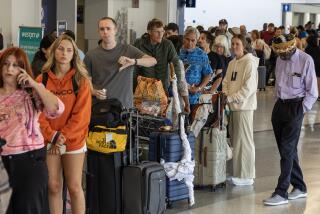The downside of skid row’s cleanup
Re “Beefed-up LAPD presence on skid row begins paying off,” Jan. 27
The Los Angeles Police Department reports that skid row’s supposed “drug bazaar” -- 5th and Crocker streets -- is being cleaned up.
And earlier this month, L.A. City Councilwoman Jan Perry presented the Community Redevelopment Agency with a proposal to grant billionaire Eli Broad $50 million in taxpayer giveaways for his Grand Avenue Project -- a development almost entirely of luxury restaurants, apartments and shopping and a massive new luxury park for downtown.
Meanwhile, it is just appalling that the poor and homeless of skid row in her district aren’t getting anything but a draconian “Safer Cities Initiative” that supposedly is cleaning up downtown. This is the disgusting reality of the current LAPD skid row action that criminalizes the homeless for merely sleeping or sitting or being on parole and on a downtown sidewalk.
DAVID BUSCH
Los Angeles
*
Given the numerous articles over the last year or so that have shed light on the experiences of people on the streets and in the shelters of skid row, I was a bit surprised at the one-sidedness of this article claiming the success of the recent sweeps. What has happened to the individuals who were living in the tents that are now gone? Have they been jailed, adding to the overcrowding problem? Are they cycling between shelters, eating up resources? Have they moved to other neighborhoods, spreading the problem of street homelessness?
It has been proved in places such as New York and Tokyo that moving people off the streets directly into permanent, subsidized housing rather than shelters or jail not only ends their homelessness but is cost-efficient.
For the recent sweeps to be considered successful, not only do the streets need to be cleaned up, we need to see improvement in the lives of those who inhabit the streets and shelters of skid row.
MATTHEW MARR
Hermosa Beach
More to Read
Sign up for Essential California
The most important California stories and recommendations in your inbox every morning.
You may occasionally receive promotional content from the Los Angeles Times.






